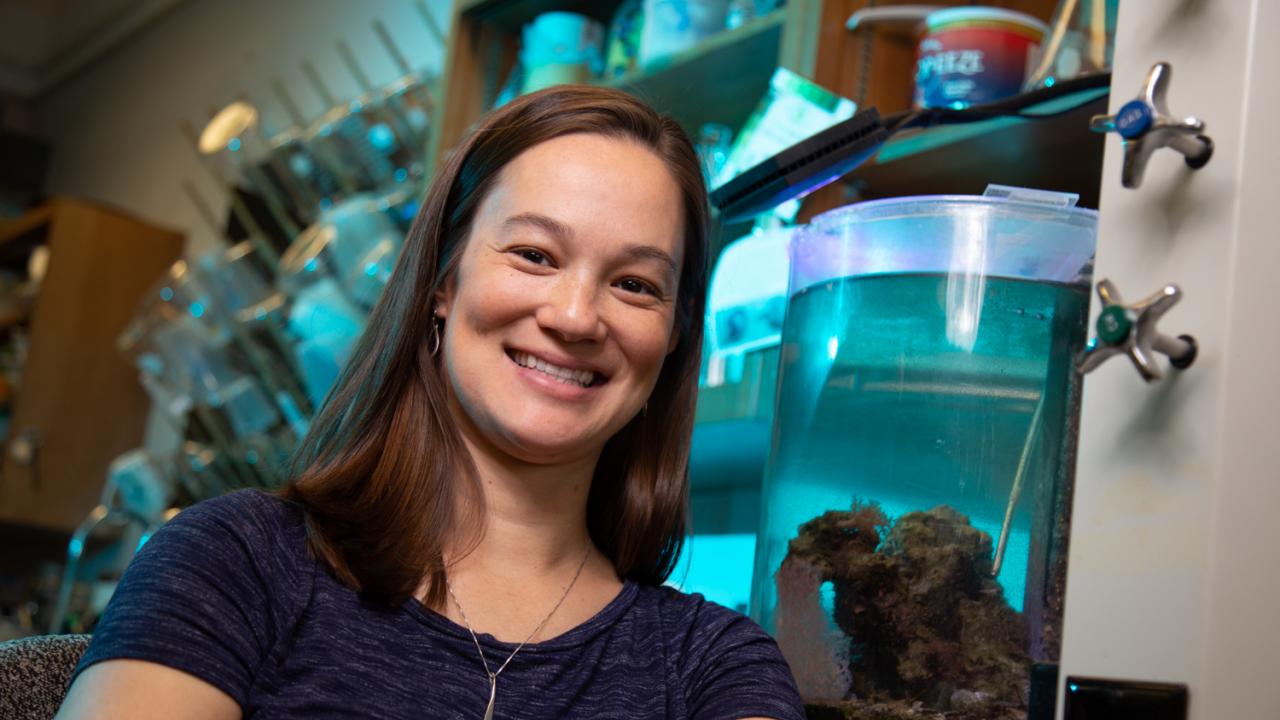
Sloan Fellowship Will Help New Faculty Rachael Bay Understand How Marine Animals Respond to Warming Temperatures
Quick Summary
- The fellowship will fund Bay's research into thermal tolerance in corals, which is becoming increasingly important as ocean temperatures shift
- Bay previously explored molecular mechanisms that lead to the physiological changes corals make to better tolerate warmer waters
- She will also study how the coastal ranges of organisms shifted due to recent warming events
Assistant Professor Rachael Bay, Department of Evolution and Ecology, learned to scuba dive far from the tropical environments conducive to coral reefs. She trained in a rock quarry located near Lake Erie in Ontario.
“All I remember is that it was very cold and very murky and I think I saw one fish the whole time,” recalled Bay. “But I really wanted to learn how to dive.”
Bay’s research and studies eventually took her to the coral reefs off Florida’s coast and in the lagoons of American Samoa and the Cook Islands in the South Pacific. As a Ph.D. student at Stanford University, she combined her interests in marine science and computational biology to study the genetics behind thermal tolerance in corals. These animal are highly sensitive to temperature shifts.
“We have pretty solid research saying that corals do acclimate to warmer temperatures,” said Bay, noting that corals exposed to non-life-threatening warm temperatures seem to acclimate better than those that haven’t been exposed to them. “That’s been shown many times in several different species, but we also know, by looking at the bleaching record, that repeated bleaching events seem more likely to lead to mortality.”
Bay will continue teasing apart this delicate balance thanks to new funding support. She was recently selected as a 2019 Alfred P. Sloan Research Fellow in Ocean Sciences.
“The really nice thing about this fellowship is it allows me as a new investigator some freedom to explore some of these really exciting ideas I’ve been thinking about,” she said. “Rather than submitting a more rigid research proposal, we now have a little bit of flexibility to explore some cutting-edge ideas.”
“Dr. Bay brings an unusual combination of expertise in organismal biology, field ecology, and genomic tools to understanding the response of organisms to climate change— from the individual to the population and species level,” said Professor Jay Stachowicz, chair of the Department of Evolution and Ecology.

Finding the “goldilocks” zone for corals
Corals are colonial animals and the reefs they create, through their own growth, are hubs for marine life. According to the National Oceanic and Atmospheric Administration, “coral reefs support more species per unit area than any other marine environment” and provide nearly $375 billion in goods and services each year. And yet, these vulnerable ecosystems face many threats, including pollution and warming.
In previous research, Bay explored the molecular mechanisms that lead to the physiological changes corals make to better tolerate warmer waters. Conducting both lab and field experiments, she identified suites of genes and genetic variants responsible for acclimation and adaptation in reef-building coral species. She’s also performed transplant studies, in which she moved corals to areas of the reef where they didn’t grow naturally to see how they’d react to different water temperatures.
“There’s some sort of balance between getting just enough exposure to high temperatures to learn how to deal with them and being repeatedly stressed enough to actually threaten your survival,” Bay added. “That’s a complicated balance I think we don’t really understand yet.”
Part of Bay’s goal is to collect comprehensive measurements of thermal tolerance in corals distributed across the Pacific. She noted that such studies are often difficult to conduct simply due to the logistics of the collecting endeavor. It’s much different than her other research animal of interest, birds. Bay has done similar research on North American birds, using genomic data to estimate rates of adaptation to climate change and to identify vulnerable populations.
“You can pretty much call up someone in any area of North America and say can you go sample some birds for me,” she said. “But for corals, because they’re scattered along all these little islands and atolls across the Pacific, it’s really hard to get to many places.”

Collaborations along the coast
Bay also wants to join forces with her colleagues at the UC Davis Bodega Marine Laboratory to establish local field systems in the region. This could be especially helpful due to the recent warming events facing the region’s aquatic flora and fauna.
“We’ve had several temperature anomalies in the marine ecosystems on the Pacific Coast,” said Bay. “We had a couple of years of El Niño and then this anomaly that they call “the blob”, which was basically just a body of warm water”
Bay noted she's eager to collaborate with Professor Eric Sanford whose research pertains to the movement of marine species as waters warm. She noted she'd like to study how the coastal ranges of organisms shifted due to recent warming events. To do this, she'll collect genomic data from individuals across the species’ geographic ranges.
“My grand goal is to integrate all this into a framework we use to predict how corals or other marine organisms might respond to climate change,” she said.

